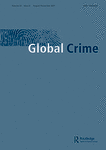By Christine Acosta Weirich
In the aftermath of the Arab Spring in 2011, many nations in the Cradle of Civilization faced civil unrest, much of which continues today in the form of the ongoing Syrian Civil War, the conflict in Yemen, and instability in nations such as Iraq and Turkey. As a consequence, antiquities and cultural heritage in the region are currently facing a notoriously exacerbated level of risk. Despite the looting and destruction of cultural objects and monuments presenting a longstanding global and historical trend, the field of antiquities trafficking research lacks a unique and effective perspective within its current body of work and research. Likewise, criminology as a scientific field of study has largely overlooked the complex issue of looting and trafficking of cultural objects. This thesis focuses on the issue of Antiquities Trafficking Networks from a crime prevention perspective and attempts to demonstrate the effectiveness and apt nature of Crime Script Analysis and Situational Crime Prevention. This is accomplished first with a study and analysis of the wider phenomenon of Antiquities Trafficking Networks (from looting to market), followed by a specific case study of antiquities trafficked from within Syria since the beginning of the Civil War. Following these analyses, thirteen prominent Situational Crime Prevention strategies for Antiquities Trafficking Networks, and ten strategies for future conflict zones are generated by this research project. Through these strategies, Crime Script Analysis – in conjunction with Situational Crime Prevention – has proven to be a highly effective and efficient method and framework for studying this particularly difficult field. Ultimately, this thesis proposes a new crime prevention-focused methodology, to help tackle the issue of antiquities trafficking, as well as presenting one of the first prevention-specific analyses in this area. In doing so, it offers a basic model that maps the structure and necessary elements for antiquities trafficking to occur and allows for future research projects to adapt or customize this script model to situation-specific cases of antiquities looting, transit, and marketing.
Ph.D. Thesis. Glasgow: University of Glasgow, 2018. 312p.



